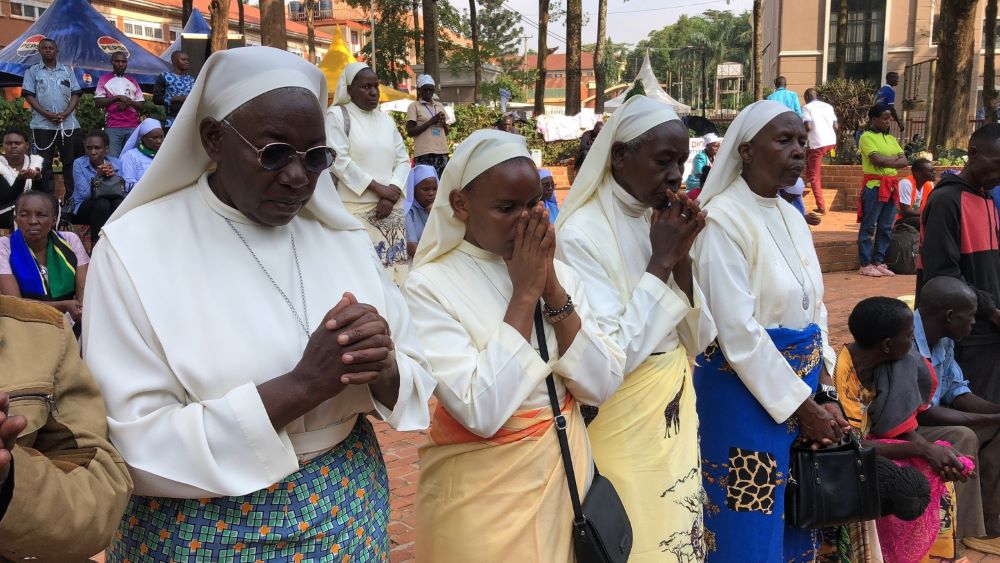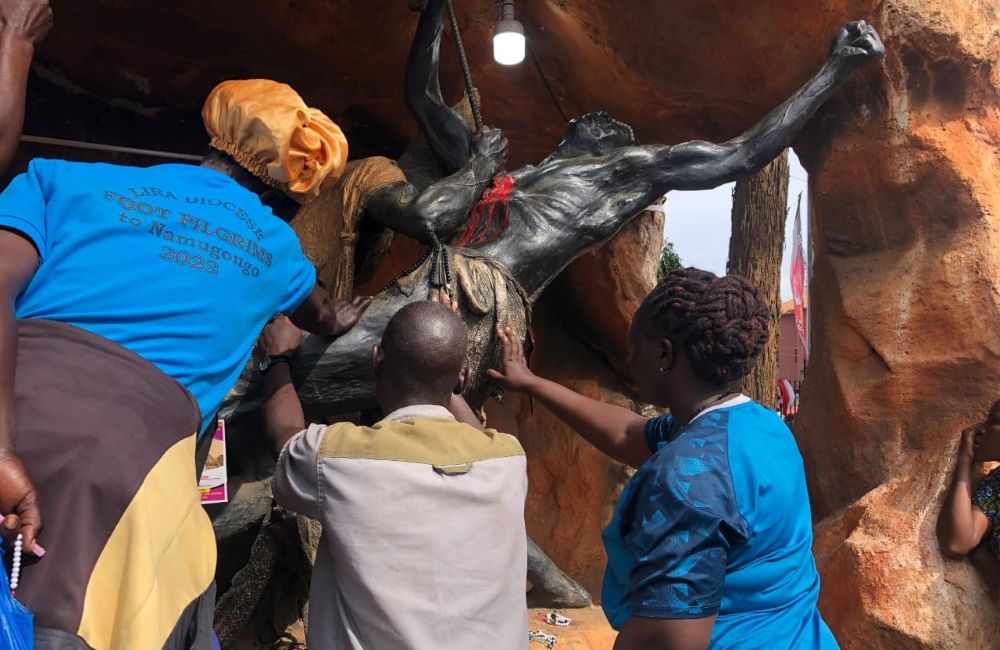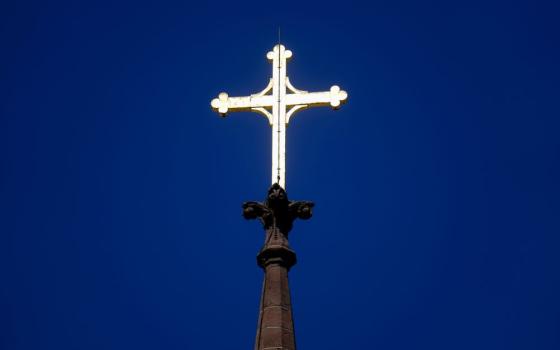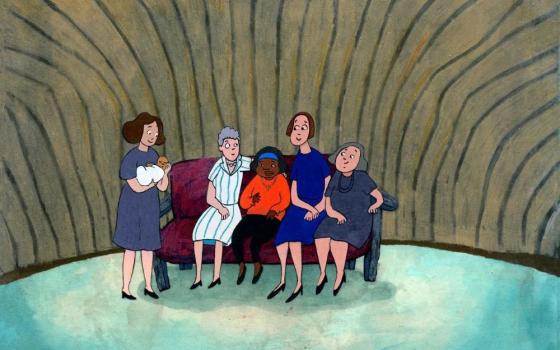
Catholic sisters pray at the Uganda Martyrs Shrine at Namugongo in Kampala, Uganda's capital. The site honors 22 Catholics killed in the 19th century for refusing to denounce their faith. (GSR photo/Gerald Matembu)
Thousands of pilgrims from across Africa knelt in prayer June 3 at the Uganda Martyrs Shrine at Namugongo, united in a publicly inviting Pope Leo XIV to visit Uganda and honor the legacy of its revered Christian martyrs.
The invitation came during Martyrs Day Mass, the country's largest annual religious event, commemorating 45 young Christian converts — including 22 Catholics and 23 Anglicans — who were killed between 1885 and 1887 for refusing to renounce their faith. The executions, ordered by King Mwanga II of Buganda, turned Namugongo into one of the most important pilgrimage sites in sub-Saharan Africa.
"Holy Father, we welcome you in advance," said Paul Masaba, a Catholic pilgrim from Lugazi Diocese in Central Uganda. The diocese led this year's Martyrs Day celebrations.
"Come and walk where saints have walked," he added. "Come and strengthen our faith as your predecessors did."
Earlier on June 3, two suspected terrorists died near the Munyonyo Martyrs Shrine in Kampala. According to military officials, a man and a woman approached the shrine on a motorcycle but were intercepted by the army's counterterrorism unit. As the officers closed in, the woman, who was reportedly wearing an explosive vest, detonated the device, killing both herself and her companion. No other injuries were reported.
Forensic experts secure the scene of a bomb blast near the Munyonyo Martyrs' Catholic Shrine in the Munyonyo suburb of Kampala, Uganda June 3 as Ugandans assembled to celebrate Martyrs' Day. The explosion killed two suspected rebels, but no other injuries were reported. (OSV News/Reuters/Abubaker Lubowa)
Authorities suspect the attackers may have links to the Allied Democratic Forces, or ADF, rebels affiliated with Islamic State group and known for past extremist violence in the region.
"Their aim was to hit a massive gathering," Col. Chris Magezi, acting director of defense public information said, as reported by the Daily Monitor.
The terrorists were stopped only 2,000 feet from the gate of the basilica packed with pilgrims. As many as 7,000 security officers were deployed to protect both Catholic and Protestant sites for the pilgrimage.
At Munyonyo, the Ugandan martyrs were sentenced to death and where some were killed. Namugongo was the martyrs' final execution site. Munyonyo is about 18 miles from Namugongo.
Despite the explosion, Uganda President Yoweri Museveni and First Lady Janet Museveni attended the Martyrs Day celebration at Namugongo.
The atmosphere there was electric. Choirs sang in Swahili, Luganda and English. Pilgrims danced with joy and bowed in reverence. Some carried wooden crosses on their shoulders; others collected jerry cans of water from wells near the shrine — a tradition believed to bring healing and protection.
In his homily at the Uganda Martyrs Lake in Namugongo, Bishop Christopher Kakooza paid tribute to the newly elected Pope Leo XIV. "He comes to lead God's flock to holiness," the bishop said, urging the faithful to unite in prayer for the pope's pastoral mission.
Kakooza, main celebrant also offered prayers for the late Pope Francis and called for a deeper reflection on the theme of the 2025 Jubilee Year, Pilgrims of Hope. "A pilgrimage is a journey of faith, by a person of faith, to a place of faith, to strengthen faith," he said.

Pilgrims pray in front of a sculpture depicting the brutal execution of a Uganda martyr, part of the Stations of the Martyrs at Namugongo. (GSR photo/Gerald Matembu)
A history of papal pilgrimages
Uganda is the only African country to have hosted three popes. Pope Paul VI, the first reigning pope to visit Africa, came to Uganda in 1969. Pope John Paul II followed in 1993. In 2015, Pope Francis made his own pilgrimage to Namugongo, calling the Uganda martyrs "true witnesses of the faith."
Notably, Uganda was the only African nation Paul VI visited during his 15-year papacy. His decision to canonize the Uganda martyrs in 1964 and visit their homeland just five years later marked a turning point in the Church's engagement with Africa.
"This land has always held a sacred bond with Rome," said Sr. Grace Angelina Aciro, superior general of the Little Sisters of Mary Immaculate of Gulu, Uganda. "Our martyrs are not just saints of Uganda — they belong to the entire universal church."
"I am sure Pope Leo XIV will plan to visit this land of the martyrs, too. Their story is so compelling that even Rome has moved to Uganda several times," she said.
This year's celebration drew pilgrims from Kenya, Tanzania, Rwanda, South Sudan, the Democratic Republic of Congo and more. Many traveled for days by foot, bicycle or bus to reach the shrine — sleeping outdoors and lining up in the early morning to attend Mass.
A nation's prayer — and invitation
The invitation to Leo XIV stood out as one of the most symbolic moments of the day. While the Vatican has not yet issued a formal response, many pilgrims who spoke to Global Sisters Report speculated that any official communication would likely come through the apostolic nunciature in Kampala.
"We hope he will take this message to the new pope and encourage him to plan a visit to our country," said Sarah Katende, a lay Catholic from the Diocese of Lugazi in Central Uganda.
"Our prayer is that Pope Leo XIV will come, not only to pay tribute to the martyrs, but also to uplift the faith of the many who look to Rome for spiritual guidance."
Advertisement
Martyrs Day has grown beyond its religious roots to become a national symbol of unity and resilience. The Uganda martyrs are honored not only in churches but in schools, national monuments, and public ceremonies. Their feast day is recognized as a public holiday, and Namugongo remains a place of pilgrimage year-round.
As Mass ended, crowds lingered in the sacred grounds, lighting candles, singing and offering personal prayers, now alight with the hope that a fourth pope will soon visit Uganda.
"He loves the African people and the church," Masaba said. "We know he will visit once he settles in."
OSV News contributed to this report.





